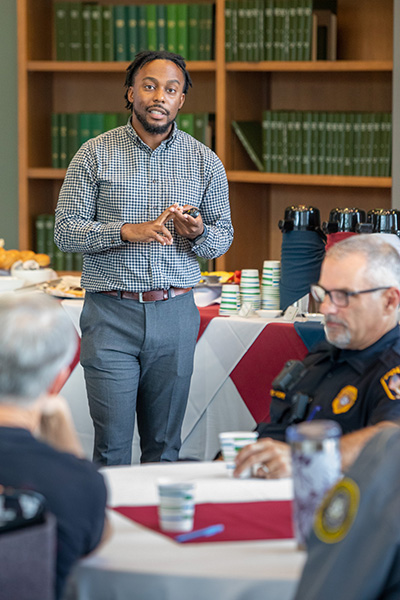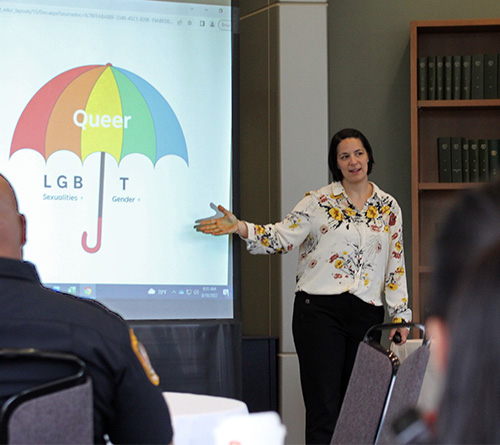- Apply
- Visit
- Request Info
- Give



Published on August 16, 2022
The Unity Wing at Eastern Connecticut State University hosted a community policing workshop on Aug. 10–11 for the public safety departments at Eastern and the University of Hartford. Led by the Intercultural Center and Pride Center, campus police from both universities learned about the latest concepts in diversity, equity and inclusion (DEI), and how to regard their communities with the utmost sensitivity.
“We better be able to communicate with our community,” said Eastern Police Chief Stephen Tavares regarding the motivation for the workshop. “That’s what the public expects of us and what I expect of our department. I would never want (one of my officers) to unwittingly disrespect someone. Otherwise, how can we say we’re a part of the community?”

Unity Wing coordinators Josh Sumrell (Intercultural Center) and Nicole Potestivo (Pride Center) opened the workshop by asking, “What is community policing?” One officer astutely answered, “Interacting with the community, talking with the people… not just sitting in your cruiser… putting yourself out there.”
Sumrell used metaphors to help workshop attendees visualize DEI. “Diversity is (people of varying backgrounds) being invited to the party, whereas inclusion is being asked to dance.”
In defining equity, he referred to an illustration of a lopsided apple tree with ladders on both sides, each a different height so its respective apple picker can reach the apples closest to them. “Equity is fair access and opportunity.”
Next was an overview of microaggressions—actions and statements that show discrimination and bias, whether intentional or unintentional. “We all commit microaggressions,” admitted Sumrell, however, “as we evolve as a society, it’s about being more mindful of our words.”
One way we can be more mindful, according to the presenters, is recognizing the difference between intent and impact. In her work at the Pride Center, Potestivo often interacts with students who are in the process of realizing their sexuality and gender identity.

“Where someone is in their identity development may determine the impact they feel,” she said of LGBTQ+ students who may be in a state of heightened sensitivity. “That same comment might not have the same impact five years from now.”
She went on to remind attendees that even if something is “’just a phase,’ it doesn’t make it any less legitimate… It’s a matter of recognizing other people’s perception.”
Sumrell and Potestivo recommend micro-affirmations as a way to advance in our individual DEI journeys. Micro-affirmations include such simple yet impactful behaviors as listening actively; asking questions; using friendly expressions and gestures; being vulnerable; recognizing the achievements of others; checking our own personal biases; etc.
They also highlighted the difference between political correctness and emotional correctness—what you say versus how you say it. The tone and feeling behind your words, “emotional correctness builds bridges between differing viewpoints.”
Acknowledging that society’s views, as well as the language, concerning DEI are constantly changing, Chief Tavares plans for this to be a recurring training, and one that continues to engage law enforcement from other institutions.
Written by Michael Rouleau